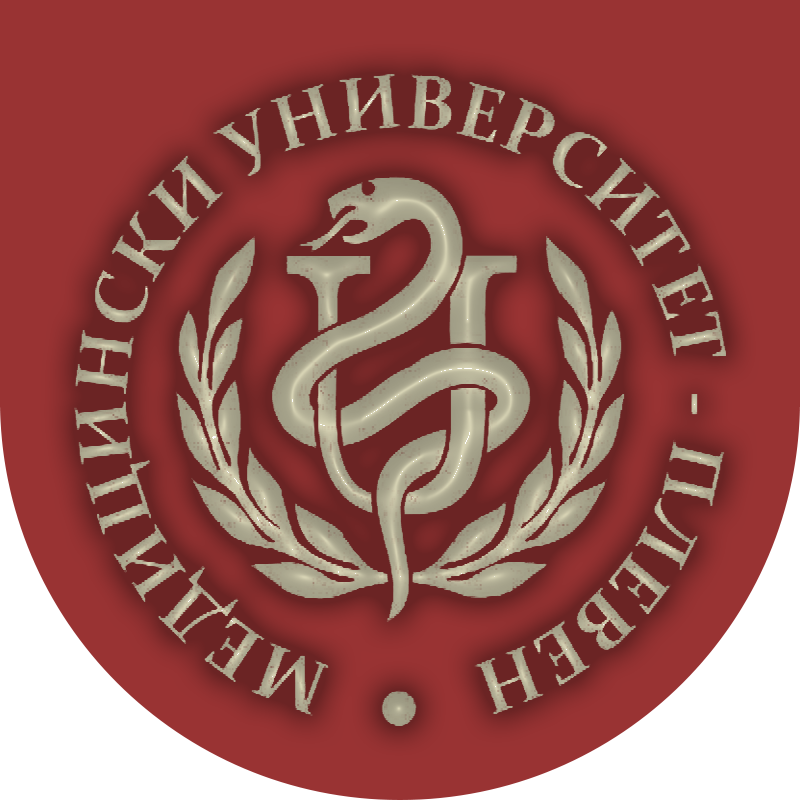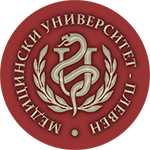SPECIALTY OF MEDICINE
The whole course of training in Medicine leading to the acquisition of the qualification Master’s degree has duration of 6 /six/ academic years. It comprises three consecutive stages: preclinical training – for 2 years, clinical training – for 3 years, and undergraduate clinical practice /Internship/ - for 1 year.
See the Curriculum in the specialty of Medicine.
The main objective of the preclinical practice is to provide professional training in the field of the studied specialty, to improve the acquired practical knowledge and skills, to cultivate work habits in order to be able to solve organizational, prophylactic, diagnostic and other professional tasks. The clinical practice /Internship/ is carried out at the various clinics of the University Hospital. After that those students who have successfully passed their state examinations acquire a diploma for completed medical education along with the qualification Master’s degree with the professional right to practice general medicine.
An English-medium course of instruction in Medicine has been adopted with parallel teaching in Bulgarian language.
MU-Pleven offers a course of training for foreign students thoroughly conducted in Bulgarian language as the medium of instruction with duration of 7 years. In their first year of training the international students are study Bulgarian language intensively with general and medical purposes, acquiring the necessary terminology in Biology, Physics and Chemistry. Those students who have successfully passed the preparatory-course exams are enrolled in a six-year course of study in Medicine.
SYLLABUS OF PROBLEM-BASED LEARNING
Problem-based learning /PBL/ is an interactive method of training that arose in the middle of the 60s at the McMaster University in Hamilton, Ontario, Canada. A great number of higher educational institutions worldwide implement this innovative technology into different forms, partly and entirely in their curriculum, more than 30 years.
The new interdisciplinary problem-based curriculum was initiated for the first time at MU-Pleven in the academic year 2000/2001. Then the so-called ‘hybrid’ model of teaching has been applied - a combination of problem-based sessions using clinical cases, with lectures and laboratory practical classes. The best part of the traditional education has been preserved with an additional new, interactive, problem-based format of training.
The problem-based training is applied experimentally in 3 or 4 student groups of a batch of 8-10 groups altogether, which has become the reason for the existence of two parallel student streams in the last five years – one with a problem-based and the other with a traditional program of studies. The problem-based syllabus has been implemented interdisciplinary in the subjects of Anatomy, Physiology and Biochemistry in the second and third semester, in Pathological anatomy and Pathological Physiology in the fourth semester, in Microbiology and Propedeutics of Surgical Diseases in the fourth semester and individually in the programs of study in Pathological Anatomy and Clinical Pharmacology.
The program of study is organized in systematic blocks with different duration depending on the syllabus and the training purposes of the disciplines involved.
Each clinical case is studied in two problem-based sessions. During the first session students are acquainted with the patient (through the clinical case in written form), they find out the problems, discuss them on the basis of their previous knowledge, form hypothesis about the reasons and mechanisms which led to the patient’s current condition determining what extra knowledge they will need to explain the processes and effects. Each question of field of knowledge which is not familiar or understood enough or entirely, and which should be perceived in order to explain the hypothesis, is defined as a matter of self-preparation (Learning Issue). This is an issue to which students are unable to find immediate answer and would need additional information to do so.
Between the two sessions students do some self-preparation on the defined issues using various sources of information: textbooks, manuals, monographs, periodicals, lectures, laboratory practical classes, the Internet, even in discussions on the appointed issues with their colleagues and professors.
During the second session students discuss what they have accumulated as new knowledge, clarify some ideas, and apply them to the clinical case afterwards. In order to solve the case, students share the difficulties which have occurred in the process of self-preparation, getting their work evaluated and even self-assessed.
Problem-based learning is actually a great replacement both in quality and quantity of the training which is oriented towards teacher-controlled accumulation of information in most disciplines. It has made a major step towards interdisciplinary problem-based learning which is entirely student-oriented. Under the conditions of PBL, students share with the professors the responsibility for their own education and become an active, leading figure in the training process, changing from taught into self-taught individuals. Unlike the teacher-centered approach, this method is established to teach the students how to study, so that they can perceive the need for lifelong training, in order to renew and adjust their knowledge to the contemporary requirements in the age of huge information and advanced technologies.
The teaching circumstances in PBL are similar to the professional conditions in which one will have to work afterwards; developing certain skills which are then highly appreciated such as: accumulating a vast amount of practically-oriented knowledge which is situated in a particular context; ability to take a decision and have a critical way of thinking, ability to study on your own for life, ability to communicate, work in a team, and maintain proper relationships, ability to assess oneself and the work of others, professional ethics and personal conduct.
Coordinator on the Syllabus for Problem-Based Learning:
e-mail:
Post-graduate Qualification
The graduates of MU-Pleven acquire the qualification General Practitioner. After additional training in the chosen specialty they acquire the rights of a certain specialty in the respective field. This is possible if they do a three or five-year course of specialization in which medical graduates from the country or abroad may be enrolled. The specialization courses are performed only in Bulgarian language while to the international post-graduate students an intensive course in Bulgarian language is offered for 6 or 8 months. After passing an entrance exam the post-graduate students start their course of training according to a syllabus composed by the head of the respective department corresponding to the discipline which they have chosen.



